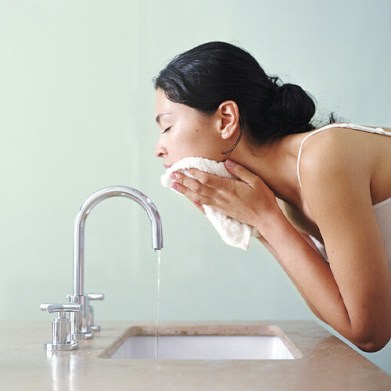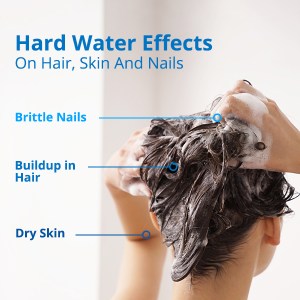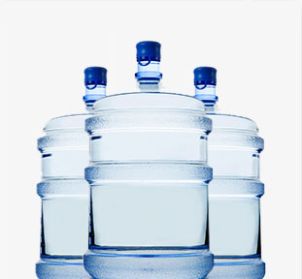
What Does Hard Water Do to Your Hair, Skin & Nails?

You Could Have Hard Water Running From Your Tap
Hard water is water that has a high volume of “hard” minerals, primarily magnesium, calcium and silica. It’s measured using grains per gallon (gpg). For water to be considered hard, it must register above 3.5 gpg. How can you tell if you have hard water running through your tap? Its presence is not always obvious, but if you pay close attention you may begin to notice the signs of hard water around your home.
If your water smells off or like rotten eggs, there’s most likely some sort of bacteria reacting with magnesium in it. Aside from the way it smells, hard water can also cause your household appliances to wear down, create buildup around fixtures, and lead to dry scalp and skin. While it may not sound like a big deal to have extra minerals floating in your tap water, hard water is a nuisance for homeowners. Fortunately, hard water testing can help you find a solution for better, softer water.
Hard Water Effects on Hair, Skin and Nails
As a homeowner, you’ll find that the quality of water coming out of your faucets can be a major concern. Where you live plays a big part in the quality of your water. Water has to travel a long way to reach your home. Along its journey it may pass through regions with high concentrations of limescale, such as mountain ranges. Depending on your region and where your water comes from, the level of hardness in your water will vary. Hard water testing can help you identify the amount of undissolved minerals in your tap water.
Although hard water is not harmful to your health overall, it can have a negative effect on your hair, skin and nails. Find out how having hard water in your home can impact your body and how a water softener can benefit you.
How Does Hard Water Affect My Hair?
Water with hard mineral content, such as magnesium, silica and calcium, can have a visible effect on your hair. Not only can hard water make it difficult to achieve a thorough rinse in the shower, which causes buildup, but it can also weaken hair follicles and allow your hair to break easily. You may wash your hair multiple times or try different shampoos and conditioners to try to fix the problem, but each time you leave the shower you’ll have the same result. The problem is coming from your water, not your rinse, lather, repeat routine. Look for the following signs that hard water is affecting your hair:
- Hair that feels filmy, straw-like, dull and limp
- Color-treated hair that fades quickly, leading to more frequent color treatments and further damage to hair
- Residual shampoo in your hair
- Hair that’s hard to lather with shampoo
- Thinning hair and breakage
- Dry scalp
How Does Hard Water Affect My Skin?
 The most common effect of hard water on your skin is dryness. Much like with your hair, hard water makes it difficult to rinse away soap from the surface of your skin, leaving it dry and potentially irritated. Furthermore, if you have sensitive skin, psoriasis or eczema, hard water can make conditions worse by drying out your skin even more.
The most common effect of hard water on your skin is dryness. Much like with your hair, hard water makes it difficult to rinse away soap from the surface of your skin, leaving it dry and potentially irritated. Furthermore, if you have sensitive skin, psoriasis or eczema, hard water can make conditions worse by drying out your skin even more.
When hard water comes in contact with your skin, some of those minerals that cause hard water get left behind, absorbing a lot of the natural moisture and oils from your skin. This lack of moisture in your skin and high levels of hard minerals can also affect the pH balance of your skin, which could potentially cause breakouts. Beyond the impact on your skin, hard water can impact your bathtub or shower as well, leaving a sticky film from soap and hard water minerals that build up over time.
How Does Hard Water Affect My Nails?
Nails are made up of numerous keratin layers that are sealed together to form a solid nail bed. The minerals found in hard water can break down your nail bed and nails over time. When you wash your hands or shower using hard water, your nails can become brittle and flaky. Moreover, hard water minerals can also dry out your nail beds and stunt the growth of your nails. After some time, your nails can become thin, weak and discolored.
What Can I Do About My Hard Water?
While you can certainly make adjustments to your daily routine to counter the impact of hard water on your body, a water softening system in your home could go a long way toward keeping your hair bouncy and bright, and your skin soft and supple. Water softeners reduce the mineral content in your water straight from the tap, leaving you with soft water throughout your entire home. Take the following steps to address a hard water problem:
- Get an in-home water test to check the actual level of hard minerals in your water
- Check out the local guides on hard water in your particular region
- Call on Culligan Water to figure out which water softener is the right solution for your household water needs
What Else You Can Do to Help Your Hair, Skin and Nails
The first step to solving your hard water problems is to test for it. Knowing what’s in your water can help you find the right solution for your home. If you have hard water running through your tap, here are other things you can do (in addition to installing a water softening system) to protect your skin, hair and nails:
Hair
- Use cold or warm water when washing your hair: Hot water can strip your hair of natural oils and cause inflammation, which can lean to split ends and breakage.
- Use deep conditioning masks and leave-in conditioners: Combat dryness caused by hard water residue by moisturizing and conditioning your hair regularly.
- Use natural treatments: Natural remedies, such as apple cider vinegar, can help protect your scalp from dryness, remove hard water residue and boost shine.
Skin
- Moisturize: Applying lotion or ointment to your skin immediately after showering can help trap moisture from escaping.
- Avoid harsh or drying soaps: Mild soaps with added oil and fats can help add moisture back into your skin.
- Limit your shower time: Showers over 10 minutes can remove natural oils from your skin; reducing your bath time can help keep your skin from drying out.
- Drink water: Keep your skin hydrated by drinking plenty of water throughout the day.
Nails
- Apply clear nail polish: A layer of clear nail polish can help trap moisture and protect your nails from the minerals found in hard water. You should remove and reapply nail polish weekly for the best results.
- Moisturize your nails: Use hand moisturizer around your nail bed to keep it from drying out.
- Take supplements: Supplements containing vitamin B, iron and magnesium can help keep your nails strong and healthy.
Hard water’s effects on hair, skin and nails should not be taken lightly. With the proper knowledge at hand, you can take the right steps toward softening your water. Let Culligan Water help you along the way to achieving better water for your skin, hair, nails and home.
Related Articles
How To Prevent White Residue on Dishes
6 min read
Limescale Causes, Effects and Solutions
6 min read
Find A Location Near Me

Schedule Your Free
In-Home Water Test
Get better water in your home by scheduling an appointment with your local Culligan Water Expert.
Discover More
See All Articles

How To Prevent White Residue on Dishes
If you’ve noticed white residue on dishes, don’t blame your dishwasher detergent. The culprit is likely hard water — a high concentration of calcium and magnesium in your water supply. […]
6 min read

Explore

Explore
Our Products

Water Softeners
With any of our soft water systems, get more out of your water-using appliances while spending less on energy and detergent.
View Products

Water Delivery
There’s never been a better time to enjoy the convenience of scheduled bottled water deliveries from the Culligan® Water Experts
View Products

Water Filtration Systems
Culligan's water filtration systems have improved water quality for thousands of families worldwide.
View Products
